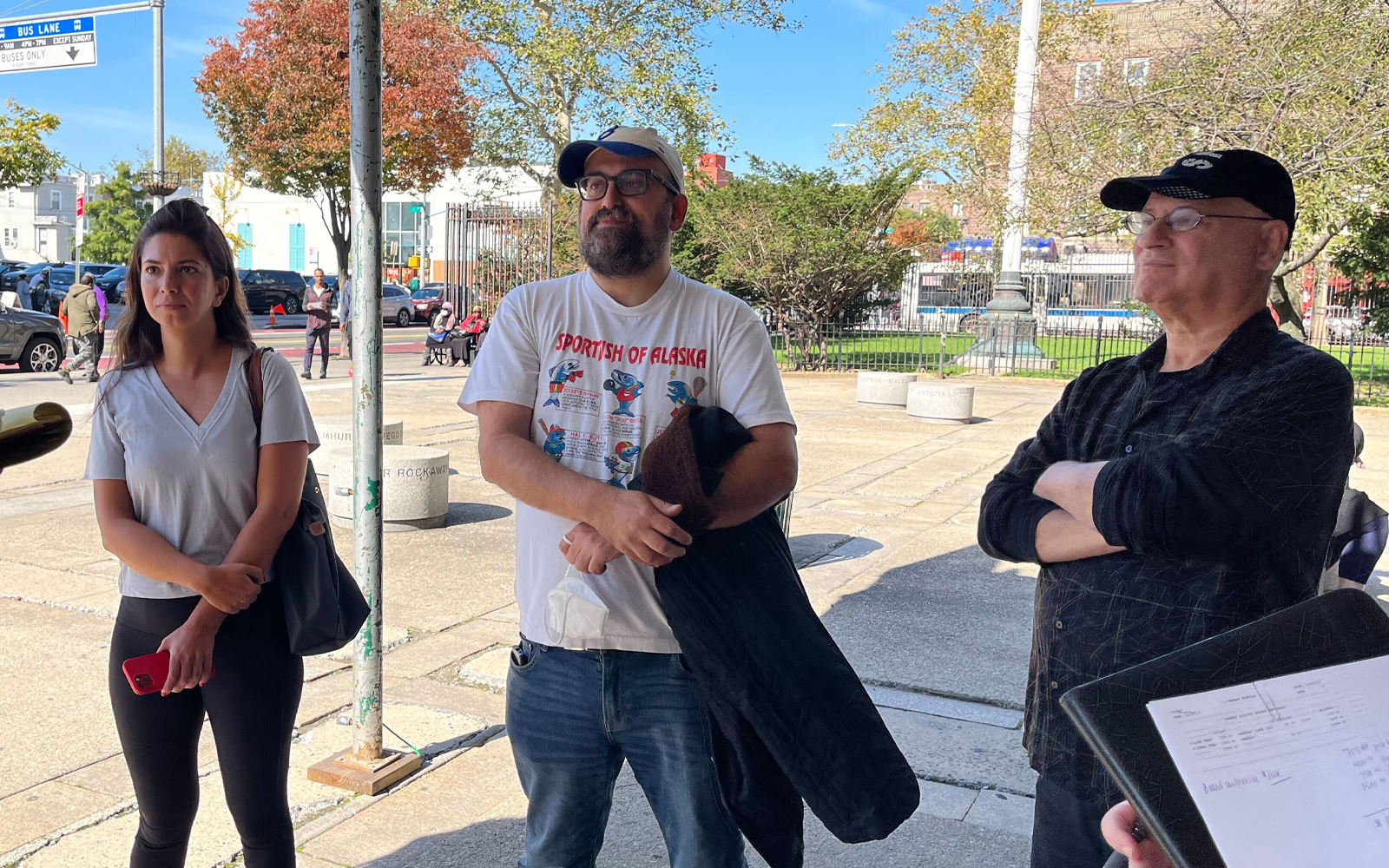If you knew nothing about a co-op, would you buy it?
The co-op might have a squatter. It could be a hoarder’s den. It might be rent-regulated. It probably needs hundreds of thousands of dollars in renovations. But there’s a chance you could double your investment.
Adam Plotch is willing to take the risk. He plays the real estate blood sport on the courthouse steps, where participants trade barbs and vie for foreclosed units as lost passersby ask for directions to divorce or criminal court.
If real estate dealmaking in New York is like cocaine, this is crack.
The co-op auctions are the end result of a type of foreclosure that happens without a judge. Such foreclosures are becoming increasingly common, since they take months instead of years, and they are happening to Manhattan trophy properties as well as smaller units in the Bronx or Queens. The small ones, with more risk and more drama, attract a different breed of investor.
“It’s the better movie,” said real estate attorney Adam Leitman Bailey, who represents co-op buildings and lenders.
The Federal Reserve Board started raising interest rates in March 2022, eroding the value of commercial real estate. Now property owners are struggling to make capital calls, while lenders are stuck carrying debt costs.
Lenders issued foreclosure notices on 62 mezzanine and other high-risk loans this year through October, more than double last year’s total, a Wall Street Journal analysis found. These include Sharif El-Gamal’s Margaritaville Hotel in Times Square and Harry Macklowe’s personal units at 432 Park Avenue, the ultra-luxury condo tower he helped develop.
The deals at co-op auctions can yield just tens of thousands of dollars in returns. But the courthouse regulars want to get in on the same distressed conditions as the deeper-pocketed players. The stakes are high, the dollar figures low.

Still, players like Plotch, who has been to thousands of auctions, admit they can’t stop hunting for the unit that will make them a tiny fortune.
“If I devoted my energy to something else, might I have done better?” wonders Plotch, a New York University theater major whose Sir Mix-a-Lot cover did not impress the judges in an early season of “American Idol.” “I have a terrible work-life balance. I don’t take off on the weekends. It’s bad.”
Like any addict, Plotch — bearded and wearing a Brooklyn Dodgers hat at the courthouse one October morning, plus a T-shirt with Alaskan sport fish playing baseball and football — and others don’t just play to win, they play to be in the game. For Plotch, litigation is a necessity, to clear liens or sue lenders and co-op boards. He’s been at it since 2003.
Before the start of a November auction behind the Kings County courthouse, another frequent shopper, Arie, stares down Plotch, who has traded the baseball cap for a red scarf and pink beret, then hurls insults at him.
At one point, he asks Plotch if he wants to say something to his face.
“Look into this guy,” Arie tells The Real Deal, looking at Plotch before putting on black sunglasses and joining the bidding.
Plotch shrugs off the dispute. Later, on the phone, Arie plays down his outburst. The gossip was “nothing juicy,” he swears.
UCC crazy
The auction begins at 11:30 a.m. Bidders want the right to buy a co-op, square footage and condition unknown. Foreclosure notices contain few details: just the amount owed, the unit number, the building address and who is foreclosing.
Auctioneer Matthew Mannion, a 6-foot-2 former Marine, reads the rules of the auction as if listing side effects on a pharmaceutical commercial.
The unit will be sold as is. The winning bidder is responsible for following co-op bylaws and could be liable for transfer taxes.
He asks Plotch to show a certified check. Plotch searches, first his front pocket and then his back. Mannion consults with the co-op attorneys away from the scaffolding in front of the courthouse.
Bidding is quick.
Mike, a newlywed who showed up to purchase his first home with his father, Angelo, wins the auction for $80,000. (Many bidders shared only their first names.)
Rami Weiss-Carmeli, another long-time participant, watches the second auction, for a Rego Park co-op, but doesn’t bid. Sabar, who’s new to the scene, wants to buy the unit as a residence, not an investment.
Auctions attract a variety of characters, Weiss-Carmeli says later. Many bidders are immigrants like Weiss-Carmeli, who moved from Israel to the U.S. in his teens. Some are just looking for a new home. Others are entrepreneurs: “It makes sense they would do this since they are basically self-employed,” he notes.
Sabar is up to $110,000 when Zach, who has been standing quietly in the corner, pipes up.
“$111,000.”
“A man for the theatrics coming in late,” Mannion says, writing the bid down in a legal pad.
“I have a terrible work-life balance. I don’t take off on the weekends. It’s bad.”
“We got a sleeper,” someone from the crowd adds. Co-ops in Rego Park go for around $300,000 in ordinary sales, according to PropertyShark.
Bidding increments shrink to $1,000. Zach and a new opponent trade bids until the price reaches $115,000.
“Any other offers?” Mannion calls.
There are none.
Mannion slams his hand on his notepad. Zach wins! The crowd claps a little.
Zach is still waiting for approval from the co-op board a month later.
Some people show up a few times, bid high, realize the numbers don’t work and never return, said Weiss-Carmeli. It’s only a handful of people who stick around.
He can usually recognize the cast of characters: attendees, co-op attorney, auctioneers — and Plotch.
“Everyone knows Adam,” said Weiss-Carmeli.

Co-op creatures
The city has over 300,000 co-op units, according to PropertyShark, the result of early 20th-century residents buying up apartment buildings through shared housing clubs. Boards govern co-ops, and they can reject anyone trying to buy into the club.
“It is the ultimate exclusionary tool in American housing, institutionalized and legal,” wrote Steven Gaines in “The Sky’s the Limit,” a book about high-end real estate in New York.
Co-op owners hold shares of a corporation, not property, and this technicality allows lenders and the co-op to file UCC foreclosures. UCCs can resolve in 60 days, while judicial foreclosure often takes years.
Here’s how it works: Instead of foreclosing on actual property, the lender or lienholder forecloses on a borrower’s “membership interests.” The person foreclosing winds up owning a shell company that controls the property, not the property itself.
By stepping into a borrower’s shoes, you also step into a borrower’s problems. There are liens and unpaid taxes, plus a senior lender who still has to be paid off. It’s almost always a mess.
Anyone who could avoid the fiasco historically did.
“On the larger assets, they would figure out a way to recapitalize, restructure the debt, or file a chapter 11 bankruptcy,” said Greg Corbin, who specializes in marketing UCC foreclosures and bankruptcies.

High interest rates changed the standard operating procedure, and bigger deals are coming through the UCC foreclosure process, a marker of distress in the market.
Corbin and Mannion say they are busier than ever.
As part of the UCC process, the “membership interests’’ have to be marketed. The ads often appear in small type on the back pages of the Wall Street Journal and in The Real Deal. Bidding must be done at a public auction.
Most of these auctions are run by Mannion, who took over the business from his father during the pandemic.
Mannion makes sure the auction goes smoothly and markets the sale notices. He also keeps the peace. Bidders will look for loopholes to sue and restart an auction.
“I’ve seen a number of auctions get chaotic,” said Corbin, “at which point Matthew steps in as the grownup in the room.”
One example: This year, 31-year old Jacob Garlick outbid developer Jeffrey Gural to acquire the Flatiron Building in an auction at the Manhattan courthouse.
Once Mannion banged his gavel, Garlick dropped to a knee and cried. In an impassioned speech, Garlick said owning the Flatiron was his life-long dream.
That dream lasted 48 hours.
Garlick failed to put down the $19 million deposit, and Mannion ran a second auction, which Gural won. Garlick hasn’t been heard from since.
“Real estate’s underbelly”
In the late 1990s, 25 New Yorkers pleaded guilty to rigging bids in foreclosure auctions at the Queens County Courthouse.
The participants colluded to buy units at a low price, only to have a second, private auction among themselves. The highest bidder at the private auction would make commission-like payoffs to compensate other conspirators for staying mum at the public transaction.
“These conspirators are among the worst kind,” the U.S. Department of Justice’s Joel Klein said in a statement at the time.
Bidders say they don’t see such schemes today. But one lawsuit against co-op boards alleges that bid rigging still exists.
“It’s the better movie.”
Because foreclosures often originate with co-op boards, which can foreclose on debts like unpaid maintenance fees just as lenders can foreclose on unpaid loans, attorneys for the boards are able to use credit bids — bids backed by their existing debt — to buy units themselves. They can then renovate and sell to buyers who are acceptable to the board, a possible motivation to foreclose on derelict units and to show up at the subsequent auctions.
Plotch claims a co-op board in Flatbush rejected him even though he won the auction, according to a lawsuit he filed in 2019. The co-op, he alleges, wanted to buy a unit on the cheap and flip it. Plotch called the co-op board’s actions a “scam” and part of a long-standing fraud.
The lawsuit also alleges that this co-op kept bids artificially low.
If a winning bid exceeds the amount of the debt, any surplus cash is supposed to go to the unit owner. Low bids meant the co-op never had to pay out the surplus.
A judge found Plotch’s allegations “concerning” but ultimately dismissed the suit on the basis that Plotch failed to provide complete financial information to the co-op in his application.
Currently occupied
Bidders squabble with each other only rarely. Usually just a few devotees show up for each auction, not enough for a fight. Only a handful of buyers seem to find the obstacles worth overcoming.
“It’s nothing that a regular person would want to take on,” said Plotch. “No one would take them on [these terms], unless you are a masochist or a gambler.”
One barrier: Winning bidders have to close in 30 days, in cash. Another: There could be a rent-regulated tenant inside the co-op. That can change the whole play.
After rental buildings were converted into co-ops across the city in the 1980s, existing rent-regulated tenants were allowed to keep their leases.
If an investor unknowingly buys a unit with a rent-regulated tenant, the new owner cannot evict them.
Plotch said he has four such units where he is losing money.
His strategy entails waiting until “they realize the weather is better in Florida.”
“Rent-stabilized tenants never die,” said Plotch. “Once you get that stabilized lease, it gives you eternal life.”
He takes the tenants in stride. The unknowns, and the possibilities, are what keep him and other bidders playing real estate Russian roulette.
“It’s the game, it’s the mystery,” said Plotch. “It’s the rush of not knowing whether you are going to win or lose.”
